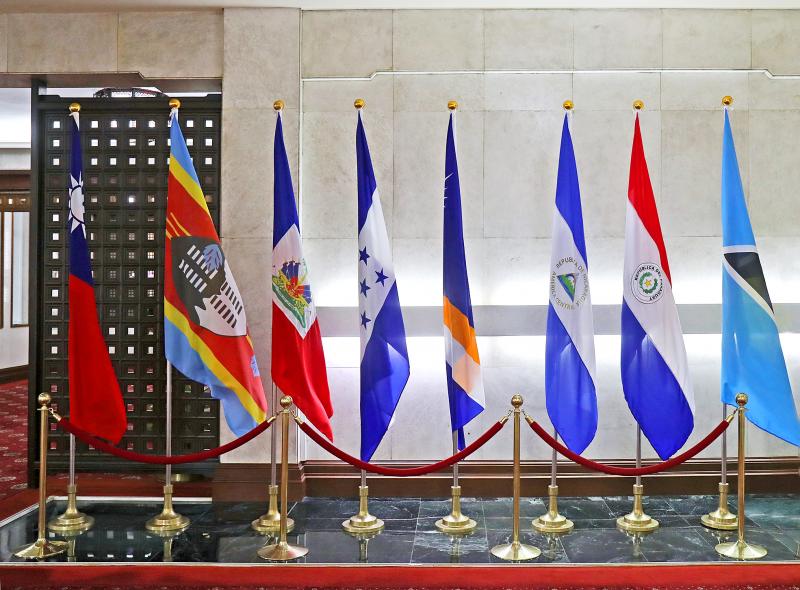Taiwan on Friday accused China of seeking to use the Honduran election to “create controversy” and undermine Taiwan’s long-standing ties with the country, saying it would strive to win support for Honduras’ relations with Taipei.
Honduras’ main left-wing opposition party, the Liberty and Refoundation Party (LIBRE), led by ousted former Honduran president Manuel Zelaya, has said that if it wins November’s presidential election it would seek to “readjust” the country’s debt and establish diplomatic relations with China.
Honduras is one of 15 UN member countries that maintain formal diplomatic relations with Taiwan.

Photo: CNA
The Ministry of Foreign Affairs, which has already warned Honduras not to be drawn in by China’s “flashy and false” promises, said that China has never stopped trying to undermine Taiwan’s relations with its diplomatic allies.
“Recently, it has even used the democratic election in our ally to create controversial topics and the false image of unstable diplomatic relations between our country and Honduras,” the ministry said, without giving details.
In the face of China’s “brutal suppression” of Taiwan’s diplomatic work, the government would “take concrete actions to demonstrate our country’s assistance to the development of Honduras’ economic and social affairs, and strive for the support of Honduras’ ruling and opposition parties for Taiwan,” it said.
Honduras has had relations for eight decades with the Republic of China, Taiwan’s formal name. That predates the Chinese Nationalist Party’s evacuation to Taiwan after loosing the Chinese Civil War in 1949 to the Chinese communists, who set up the People’s Republic of China in Beijing.
China’s efforts to win over Taiwan’s remaining allies have alarmed Washington, which is especially concerned about Beijing’s growing influence.
In September 2019, the Solomon Islands and Kiribati were the last countries to cut ties with Taipei.

Taiwanese can file complaints with the Tourism Administration to report travel agencies if their activities caused termination of a person’s citizenship, Mainland Affairs Council Minister Chiu Chui-cheng (邱垂正) said yesterday, after a podcaster highlighted a case in which a person’s citizenship was canceled for receiving a single-use Chinese passport to enter Russia. The council is aware of incidents in which people who signed up through Chinese travel agencies for tours of Russia were told they could obtain Russian visas and fast-track border clearance, Chiu told reporters on the sidelines of an event in Taipei. However, the travel agencies actually applied

Japanese footwear brand Onitsuka Tiger today issued a public apology and said it has suspended an employee amid allegations that the staff member discriminated against a Vietnamese customer at its Taipei 101 store. Posting on the social media platform Threads yesterday, a user said that an employee at the store said that “those shoes are very expensive” when her friend, who is a migrant worker from Vietnam, asked for assistance. The employee then ignored her until she asked again, to which she replied: "We don't have a size 37." The post had amassed nearly 26,000 likes and 916 comments as of this

New measures aimed at making Taiwan more attractive to foreign professionals came into effect this month, the National Development Council said yesterday. Among the changes, international students at Taiwanese universities would be able to work in Taiwan without a work permit in the two years after they graduate, explainer materials provided by the council said. In addition, foreign nationals who graduated from one of the world’s top 200 universities within the past five years can also apply for a two-year open work permit. Previously, those graduates would have needed to apply for a work permit using point-based criteria or have a Taiwanese company

The Shilin District Prosecutors’ Office yesterday indicted two Taiwanese and issued a wanted notice for Pete Liu (劉作虎), founder of Shenzhen-based smartphone manufacturer OnePlus Technology Co (萬普拉斯科技), for allegedly contravening the Act Governing Relations Between the People of the Taiwan Area and the Mainland Area (臺灣地區與大陸地區人民關係條例) by poaching 70 engineers in Taiwan. Liu allegedly traveled to Taiwan at the end of 2014 and met with a Taiwanese man surnamed Lin (林) to discuss establishing a mobile software research and development (R&D) team in Taiwan, prosecutors said. Without approval from the government, Lin, following Liu’s instructions, recruited more than 70 software